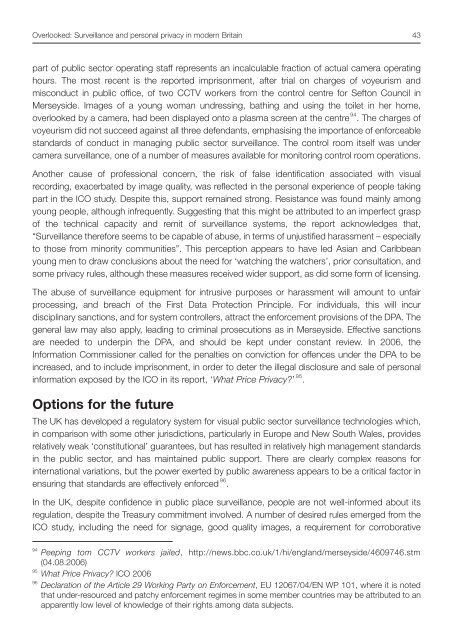Overlooked - Liberty
Overlooked - Liberty
Overlooked - Liberty
You also want an ePaper? Increase the reach of your titles
YUMPU automatically turns print PDFs into web optimized ePapers that Google loves.
<strong>Overlooked</strong>: Surveillance and personal privacy in modern Britain 43<br />
part of public sector operating staff represents an incalculable fraction of actual camera operating<br />
hours. The most recent is the reported imprisonment, after trial on charges of voyeurism and<br />
misconduct in public office, of two CCTV workers from the control centre for Sefton Council in<br />
Merseyside. Images of a young woman undressing, bathing and using the toilet in her home,<br />
overlooked by a camera, had been displayed onto a plasma screen at the centre 94 . The charges of<br />
voyeurism did not succeed against all three defendants, emphasising the importance of enforceable<br />
standards of conduct in managing public sector surveillance. The control room itself was under<br />
camera surveillance, one of a number of measures available for monitoring control room operations.<br />
Another cause of professional concern, the risk of false identification associated with visual<br />
recording, exacerbated by image quality, was reflected in the personal experience of people taking<br />
part in the ICO study. Despite this, support remained strong. Resistance was found mainly among<br />
young people, although infrequently. Suggesting that this might be attributed to an imperfect grasp<br />
of the technical capacity and remit of surveillance systems, the report acknowledges that,<br />
“Surveillance therefore seems to be capable of abuse, in terms of unjustified harassment – especially<br />
to those from minority communities”. This perception appears to have led Asian and Caribbean<br />
young men to draw conclusions about the need for ‘watching the watchers’, prior consultation, and<br />
some privacy rules, although these measures received wider support, as did some form of licensing.<br />
The abuse of surveillance equipment for intrusive purposes or harassment will amount to unfair<br />
processing, and breach of the First Data Protection Principle. For individuals, this will incur<br />
disciplinary sanctions, and for system controllers, attract the enforcement provisions of the DPA. The<br />
general law may also apply, leading to criminal prosecutions as in Merseyside. Effective sanctions<br />
are needed to underpin the DPA, and should be kept under constant review. In 2006, the<br />
Information Commissioner called for the penalties on conviction for offences under the DPA to be<br />
increased, and to include imprisonment, in order to deter the illegal disclosure and sale of personal<br />
information exposed by the ICO in its report, ‘What Price Privacy’ 95 .<br />
Options for the future<br />
The UK has developed a regulatory system for visual public sector surveillance technologies which,<br />
in comparison with some other jurisdictions, particularly in Europe and New South Wales, provides<br />
relatively weak ‘constitutional’ guarantees, but has resulted in relatively high management standards<br />
in the public sector, and has maintained public support. There are clearly complex reasons for<br />
international variations, but the power exerted by public awareness appears to be a critical factor in<br />
ensuring that standards are effectively enforced 96 .<br />
In the UK, despite confidence in public place surveillance, people are not well-informed about its<br />
regulation, despite the Treasury commitment involved. A number of desired rules emerged from the<br />
ICO study, including the need for signage, good quality images, a requirement for corroborative<br />
94<br />
Peeping tom CCTV workers jailed, http://news.bbc.co.uk/1/hi/england/merseyside/4609746.stm<br />
(04.08.2006)<br />
95<br />
What Price Privacy ICO 2006<br />
96<br />
Declaration of the Article 29 Working Party on Enforcement, EU 12067/04/EN WP 101, where it is noted<br />
that under-resourced and patchy enforcement regimes in some member countries may be attributed to an<br />
apparently low level of knowledge of their rights among data subjects.















